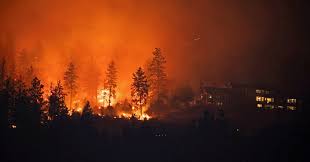Current State of Forest Fires in British Columbia

Introduction
Forest fires in British Columbia (BC) have become an increasingly critical issue in recent years, especially as climate change continues to exacerbate extreme weather conditions. With the province experiencing hotter and drier summers, the frequency and intensity of wildfires are rising, posing risks to communities, ecosystems, and air quality. The summer of 2023 has been particularly challenging, marked by devastating fires that have prompted evacuations and emergency responses across the province.
Current Situation
As of late summer 2023, BC has reported over 1,000 wildfires, burning more than 800,000 hectares of land. The BC Wildfire Service has identified several regions under high alert, particularly the Interior and the northern parts of the province. The historic heatwaves combined with prolonged drought conditions have contributed to this year’s unprecedented wildfire activity.
In response to the escalating fire risks, the provincial government has implemented various measures, including heightened fire bans, increased funding for firefighting resources, and public education campaigns regarding fire safety. Additionally, collaboration with First Nations and local governments is a priority, ensuring that traditional ecological knowledge informs prevention strategies.
Recent Events
One of the most significant events was the fire in the Spuzzum area, which led to the evacuation of over 400 residents in August 2023. The presence of strong winds complicated firefighting efforts, causing the fire to spread rapidly and consume vital natural resources. The government declared a state of emergency in multiple regions, enabling a coordinated response among local, provincial, and federal firefighting teams.
Air quality has also been heavily impacted, with smoke drifting southwards into Washington and affecting air quality as far away as California. Health officials have warned residents to stay indoors and limit outdoor activities until the situation improves.
Conclusion
With the forest fire season far from over, BC residents are urged to remain vigilant and prepared for potential evacuations or emergencies. Experts forecast that climate conditions will continue to evolve, making proactive fire prevention strategies essential. Community engagement and awareness of fire risks remain crucial in mitigating the effects of wildfires not just this year, but for future generations. Ongoing research and development of fire-resistant landscapes are pivotal in protecting both natural ecosystems and human communities in the long term.


